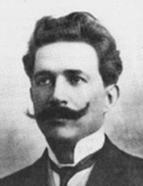

Manoel Bomfim was a Brazilian essayist, born on 8 August 1868 in Aracaju, Sergipe, and died on 22 April 1932 in Rio de Janeiro. The son of Paulino José do Bomfim, a merchant and plantation owner, he received his early education in his hometown. In 1886, he enrolled at the Faculty of Medicine in Bahia. Two years later, he moved to Rio de Janeiro, then the federal capital, where he completed his medical degree with a thesis titled Das nefrites [On Nephritis] (1890). However, he practised medicine only briefly. The early death of his daughter during a typhus epidemic profoundly affected him, leading him to abandon his medical career and dedicate himself to education and social studies.
Bomfim became an advocate for popular education and entered the teaching profession, where he taught Moral and Civic Instruction, Portuguese Language, Pedagogy, and Psychology Applied to Education at the Escola Normal do Rio de Janeiro [Rio de Janeiro Normal School]. He also held various public positions, including serving as the general director of Pedagogium , a public institution established after the proclamation of the Republic in 1897 to coordinate pedagogical activities nationwide. Shortly thereafter, he was appointed head of Instrução Pública do Distrito Federal [Public Education of the Federal District] (1898). On behalf of the Prefeitura do Distrito Federal [Prefecture of the Federal District], he undertook an internship at the Sorbonne University, studying under the distinguished professor Alfred Binet in the chair of Experimental Psychology (1902–1903). Upon his return to Brazil, he resumed his work at the Pedagogium and established the country’s first experimental psychology laboratory.
In addition to combating illiteracy, the doctor and pedagogue was dedicated to instilling in children the principles of civility and patriotism. In 1905, together with Luís Bartolomeu and Renato de Castro, he co-founded O Tico-Tico , Brazil’s first educational comic book for children. The publication ran until February 1962, achieving an impressive total of 2,097 issues. Manoel Bomfim proposed to the mayor of the Distrito Federal [Federal District], Pereira Passos, the idea of composing an anthem to honour the Bandeira Nacional [National Flag], to be sung daily by students in Rio de Janeiro’s public schools. The project came to fruition with lyrics by Olavo Bilac and music by Francisco Braga, culminating in the official adoption of the Hino à Bandeira [Brazilian Flag Anthem] by the Republic on 19 November 1906. Around the same time, Bomfim formed a close relationship with Pinheiro Machado, one of the most influential political leaders of the era. This connection facilitated his election as a federal deputy for the state of Sergipe (1907–1908). However, his attempt at reelection was unsuccessful, prompting him to abandon his political career. In 1911, Bomfim was reappointed as director-general of the Pedagogium , a position he held until the institution was closed in 1919. Following this, he devoted himself exclusively to working in journalism and producing literary works. After his death, friends and followers established the Sociedade Manoel Bomfim [Manoel Bomfim Society] on 21 April 1933 to carry forward his educational legacy. Although it brought together prominent figures in literature and education, the Sociedade Manoel Bomfim was short-lived, ceasing to exist around 1935.
This work is financed by national funds through FCT - Foundation for Science and Technology, I.P, in the scope of the projects UIDB/04311/2020 and UIDP/04311/2020.
